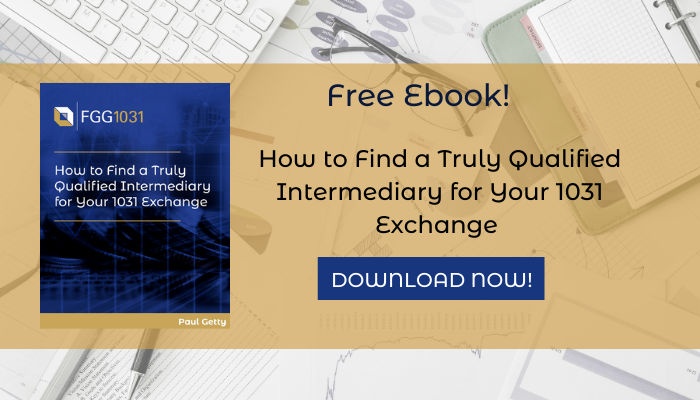When considering whether to pursue a 1031 Exchange, potential benefits can sometimes relegate the costs to the shadows. Considering both will help investors make an informed decision.
In a 1031 Exchange, the proceeds from the sale of one real estate investment can be used to purchase a like-kind investment of equal or greater value to defer capital gains and depreciation taxes. Instead of paying the government, investors have the potential to expand or diversify their real estate portfolio, strengthen their estate, or re-evaluate investment objectives.
At the same time, if investors are not careful, fees can eat into those benefits. Some of the costs are specific to 1031 Exchange requirements, some are standard to most real estate transactions, and some depend on individual circumstances. This article will examine the different costs and how they may impact your decision.
Qualified Intermediary
Every investor must use a Qualified Intermediary (QI) to facilitate a 1031 Exchange. The QI safeguards the proceeds from the sale of the relinquished property, ensuring the investor does not cause a taxable event by taking possession of the funds. The QI also documents the identified replacement properties, makes sure deadlines are met, transfers the funds to close on the replacement property, handles paperwork such as tax forms, and assists the investor at almost every step of the process. An experienced QI can make the difference between successfully completing a 1031 Exchange and one that falls short from a missed deadline or is nullified years later in an audit.
In return, investors can generally expect to pay a QI $700 to $1,500, depending on location, experience, and the number of properties involved.
Covering costs with sale proceeds
Many of the standard direct costs associated with real estate transactions will also be part of a 1031 Exchange. Although the IRS has not published a complete list of qualifying expenses, there are some rulings that provide general parameters e.g., Revenue Ruling 72-456 and IRS Ruling 8328011.
Costs that are generally allowed as qualifying expenses can include:
- Real estate commissions
- Closing or escrow fees
- Title insurance premiums
- Notary fees
- Recording fees
- Legal fees
- Transfer taxes
- Qualified Intermediary fees
ITEMS THAT ARE NOT CONSIDERED “EXCHANGE EXPENSES”
Operating expenses paid at closing from 1031 proceeds will create a tax liability for the exchanger.
- Utility charges
- Property taxes
- Association fees
- Hazard insurance
- Credits for lease deposits
- Prepaid rents and security deposits
The following costs related to obtaining a new loan should not be deducted from the proceeds.
- Mortgage points and assumption fees
- Credit reports
- Lender’s title insurance
- Prorated mortgage insurance
- Loan acquisition fees (such as points, mortgage insurance, application fees, lender’s title insurance, assumption fees, appraisal fees, hazardous waste/property inspections required by the lender)
Many of these costs will vary by region and local business practices, but it is always best to consult your tax advisor for guidance. As discussed above, those costs can be covered using the sale proceeds.
The equal-or-greater-value requirement
A main component of a 1031 Exchange is that the replacement property must be of equal or greater value compared with the relinquished property. That means if you sell one property for $500,000, the replacement investment must have a net sales price of at least $500,000.
Items such as closing costs, title taxes, and commissions can reduce the gross sales price, so it is crucial to focus on the net price.
Sometimes investors may need to take possession of a portion of the proceeds from the sale of the relinquished property and in turn purchase a less expensive replacement property. This would be considered a partial 1031 Exchange and investors are required to pay taxes on the pocketed profits.
Delaware Statutory Trusts (DSTs)
DSTs are long-term passive investments in which interests in a trust are owned rather than actual property. DSTs are often considered as part of a 1031 Exchange, because they can be used as a last-minute replacement property if the initial properties identified fall through or if the replacement properties do not fully match IRS 1031 guidelines and create partial tax liability. DSTs can also eliminate the middle-of-the night calls from tenants or other headaches sometimes associated with actively managed properties.
DSTs are subject to traditional real estate risks and cash flow is not guaranteed. There are also substantial costs in creating and managing DSTs which must be absorbed prior to investor returns.
While competition has driven many of these costs lower in the past few years, it’s always best to carefully review the DST’s offering memorandum for the detailed cost structure and seek inputs from a knowledgeable agent to assist you in comparing the relative costs of DSTs that you may be considering.
Making your decision
Many of the costs involved in a 1031 Exchange are common to all real estate transactions. Additional costs, such as a QI and DST oversight either help the investor navigate the complexities of a 1031 Exchange or lesson the demands on the investor.
It is important to consider all potential costs to help determine whether the benefits of deferring capital gains and depreciation taxes as part of a 1031 Exchange are your best path forward.
As always, contact us with questions about 1031 Exchanges and speak with your tax or financial professional for recommendations related to your individual situation.
For an in-depth look at the QI role and how to find one that will fit your objectives, download our eBook How to Find a Truly Qualified Intermediary for Your 1031 Exchange, available now!









Your Comments :